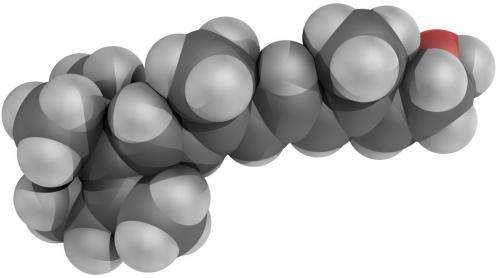January 24, 2014 report
Study shows vitamin A deficiency promotes type 2 barrier immunity

(Medical Xpress)—A team of researchers made up of members from a variety of institutions across the U.S. has found that a lack of vitamin A in the diet may help ward off worm infections. In their paper published in the journal Science, the team describes several experiments they conducted with vitamin A and mice to learn about its impact on barrier immunity and what they found as a result.
A lack of vitamin A in the diet has been linked to several maladies, from night blindness to an increased risk of asthma attacks. It's also been linked to immunity problems. Understanding how vitamin A works with the immune system is important because millions of impoverished people the world over suffer from such a deficiency. In this new effort the researchers investigated the role of vitamin A and barrier immunity, the so-called first line of defense, where T cells are activated against invaders in the skin or the gastrointestinal tract.
To learn more about the relationship between T cell activation and vitamin A, the researchers took two approaches, one involved feeding mice a vitamin A restricted diet. The other involved causing a reduction in the production of retinoic acid in mice—a metabolite of vitamin A.
A reduction in either showed a corresponding reduction in innate lymphoid cells 2 (LL2) but an increase in innate lymphoid cells 3 (LL3). Prior research has found that both LL2 and LL3 play a role in innate immunity, thus a reduction in LL2 due to lowered vitamin A levels in both humans and mice would seem to reduce the effectiveness of an immune response. The increase of LL3, on the other hand was a surprise. Thus far it's not clear if it implies an increased immune response in general, though it does appear to offer protection from another threat—parasitic worms. In another set of experiments, the researchers exposed mice on a vitamin A restricted diets to parasitic worms and found it caused a drop in infection rates. They found the same outcome with mice with reduced levels of retinoic acid.
The researchers suggest that the immune system in mice responds to the sudden loss of vitamin A by boosting other avenues of defense. What's still not clear, however, is if boosting vitamin A in the diets of malnourished people puts them at greater risk of contracting parasitic worm infections.
More information: Adaptation of Innate Lymphoid Cells to a Micronutrient Deficiency Promotes Type 2 Barrier Immunity, Science 24 January 2014: Vol. 343 no. 6169 pp. 432-437. DOI: 10.1126/science.1247606
ABSTRACT
How the immune system adapts to malnutrition to sustain immunity at barrier surfaces, such as the intestine, remains unclear. Vitamin A deficiency is one of the most common micronutrient deficiencies and is associated with profound defects in adaptive immunity. Here, we found that type 3 innate lymphoid cells (ILC3s) are severely diminished in vitamin A–deficient settings, which results in compromised immunity to acute bacterial infection. However, vitamin A deprivation paradoxically resulted in dramatic expansion of interleukin-13 (IL-13)–producing ILC2s and resistance to nematode infection in mice, which revealed that ILCs are primary sensors of dietary stress. Further, these data indicate that, during malnutrition, a switch to innate type 2 immunity may represent a powerful adaptation of the immune system to promote host survival in the face of ongoing barrier challenges.
© 2014 Medical Xpress
















